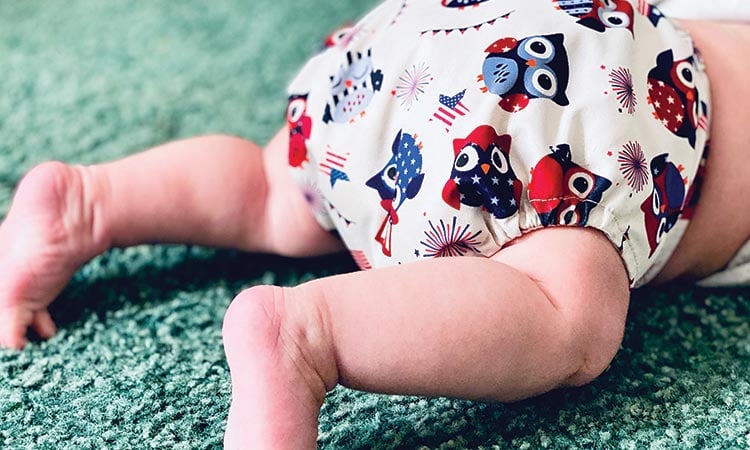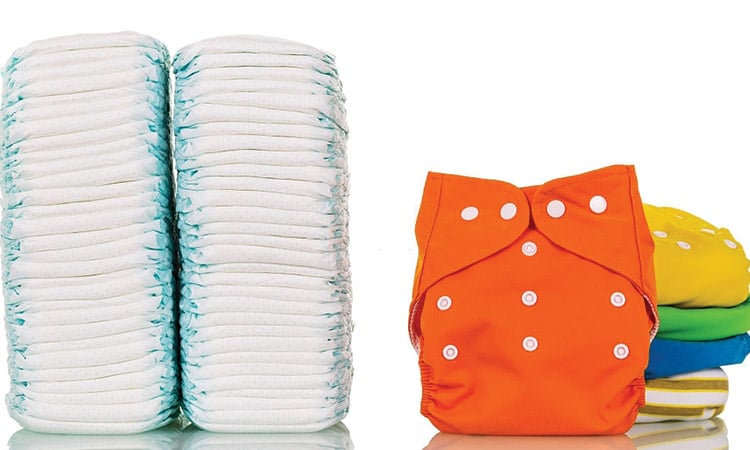When it comes to taking parenting decisions, choosing cloth diapers vs disposable ones is one of the essential decisions to make. Perhaps your elders have been advising you to use cloth diapers because they used them too. Or maybe you weighed in the convenience factor and want to go for disposables. Either way, parenting is all about making choices for yourself and your baby, and it starts as soon as the baby is born.
When considering diapers for your newborn, you will weigh in many factors – health and hygiene being supreme. At this point, your baby’s skin is very sensitive and could easily get rashes or other related inflammations. Hence, making the right choice for your baby’s comfort is every mother’s dilemma.
Cloth Diapers vs Disposable Diapers- 8 Differentiating Points
When thinking about cloth diapers vs disposable diapers,you will come across a number of choices. Go for the diaper that suits your baby’s comfort, lifestyle and your overall budget.
Cloth diapers, also known as cloth nappies are made from natural fibres or man-made fabric. The main differentiating point is that they are reusable, unlike disposable diapers.
Over the years, cloth diapers have come a long way. From becoming a laundry hassle for last generation parents, it has become a lifeline for today’s parents. Apart from being available in a number of breathable fabrics, it is also a boon for the environment. If you are still thinking about which diaper is best for your baby, here are 11 major distinctions between cloth diapers vs disposable diapers.
1. The cost factor

On an average, one disposable diaper costs around Rs. 10-12 and an average baby requires over 2500 diapers. In comparison to disposable diapers, a high-quality cloth diaper pack costs around Rs.1000 and above. That can be quite a differentiating factor because a baby uses about 7-10 diapers a day for the first few months of his life.
Now, cloth diapers aren’t cheap either, but keeping in mind that cloth diapers are reusable and can be passed on from one baby to another, they are definitely budget friendly option for parents.
2. Skin comfort for the baby
The point to note here is that diapers need to be changed when soiled – whether they are cloth or disposable. However, considering cloth diapers are not designed to hold a lot of poo or pee, they are required to be changed more often. Disposable diapers, on the other hand, can get soiled and still not smell bad or leak- making you forget they need to be changed.
Disposable diapers are used for longer hours in comparison to cloth diapers. This is because they are expensive and aren’t changed unless the bottom of the diaper is heavy enough for a change. As a result, the baby may get small infections because of their diaper not being changed frequently. Cloth diapers can be changed frequently, keeping your baby clean and dry.
Disposable diapers are harsh on the baby’s skin and could cause redness and rashes. This is because disposable diapers contain chemicals which cause discomfort and redness on the baby’s sensitive skin. Moreover, an allergic reaction to diapers such as diaper dermatitis that can be also caused by disposable diapers.
Cloth diapers, on the other hand, come in breathable fabrics which protect the baby’s skin from any harshness or rashes that could be caused due to disposable diapers. Being more comfortable, cloth diapers also help your baby in having a more peaceful sleep. Your baby will wake up less in the middle of the night.
Nowdays, you also get colour changing disposable diapers that indicate the need for change when they are full.
3. Longevity

A set of cloth diapers can be used for the entire duration till your baby is potty trained. Good quality cloth diapers remain intact and can be used for the next baby too.The longevity of disposable diapers doesn’t last for more than a few hours. Some disposable diapers also tear easily while being worn.
Cloth diapers have multiple uses too. If you don’t have any other baby to pass them on to, you can convert them into burping cloths or bibs. It can also be made into a cleaning cloth for dusting or washing windows.
4. Environmental impact
On an average, a baby needs 8-12 disposable diapers per day which amounts to around 320 diapers a month. These diapers form non-recyclable and chemical wastes which are harmful for the environment. Most disposable diapers end up in landfills and are a nuisance for the environment.
The reusable factor in cloth diapers makes it environmentally friendly, making it an eco-friendly investment. You can last a month with just 10 diapers, against 320. And the 10 can remain constant for the coming months too.
5. Soaking capacity
With both cloth and disposable diapers, there’s always a chance of leakage and poop oozing out. However, disposable diapers come with various features that allow the pee to be soaked up better than cloth diapers. For longer hours without a diaper change, disposable diapers definitely score better.
The need to change is more frequent with cloth diapers. Some cloth diapers also come with water-proof sides and bands around the waist and legs to contain leakages. In the case of most premium cloth diapers, they come with a waterproof outer cover or an absorbent inner layer which also helps in keeping your baby dry. Yet, there is no denying the fact that cloth diapers are not designed for longer durations.
6. Cloth diapers offer more variety

Cloth diapers come in a variety of fabrics such as cotton, flannel, wool, muslin, linen, etc. Parents get to choose which material is more comfortable for their baby’s sensitive skin. With disposable diapers, you don’t get that option as all disposable diapers are made with synthetic materials.
Along with better functionality, cloth diapers can also be used to add colour into your baby’s life. Cloth diapers come in several vibrant designs which make the hassle of pooping actually fun for both the parent and the baby. Plain white disposable diapers don’t have the fun factor in them.
7. One size for your baby
Cloth diapers are uniquely designed with adjustable buttons and Velcro strips so that it can be used even when your baby gets older. These adjustable buttons also ensure that the diaper is leakproof. You don’t have to go through the problem of changing the size of the diaper as the baby grows up, which is the case in disposable diapers.
Having cloth diapers is also a useful tool to prepare your baby for potty training. Though cloth diapers are absorbent, they do not always keep the baby’s bottom dry. Thus, having a wet bottom can act as an incentive for your baby to potty train.
8. Convenience
Both types of diapers are easy to use and can easily fit into your bag. Talking about ease of use, both types of diapers come in pant style too which are easy to put on and remove. Cloth diapers come with Velcro tapes that help in quick and easy changing.
However, carrying a spoilt cloth diaper becomes a hassle, especially when you have to change your baby’s diaper when you are outdoors. You can’t dispose of the diaper and have to carry the dirty diaper with you. In such a situation, disposable diapers are more convenient.
Parents think that cloth diapers are a laundry hassle. However, cleaning a cloth diaper actually involves just two steps- remove the dirty parts with the help of the hand shower or tap and put it for a wash.
Though disposable diapers don’t need to be cleaned, disposing 10-12 diapers everyday becomes a hassle for parents.
What To Choose Between Cloth Diapers vs Disposable Diapers?

Cloth diapers have actually been used for generation by our parents and grandparents. These cloth diapers are just a modern and more comfortable version of those age-old nappies that our parents used to use.
As mentioned earlier, some benefits of cloth diapers are reducing redness, diaper rash and other related allergies that can irritate your baby’s sensitive skin. This is one of the major concerns that parents have about their baby’s sensitive skin.
If you are a parent from whom the cost factor, environmental impact, soaking capacity, longevity, ease of washing, and most importantly your baby’s comfort is a priority, cloth diapers are the best choice.
Disadvantages of cloth diapers
Handling a cloth diaper especially when your baby poops can be a stinky affair. The smell can become unbearable at times. Though cleaning cloth diapers isn’t that big of a hassle, half your laundry will be filled with cloth diapers.
Tips for using cloth diapers
- It is important to make sure that you wash your hands after changing your baby’s diaper. This is because, even though the diaper is clean from outside, some bacteria from your baby’s excreta can be transferred to your hands.
- Store all dirty diapers in a washable bag. This will help in containing the smell of the dirty diaper. You can wash the bag along with the diapers so that everything stays fresh.
- Before washing the cloth diapers, you can soak the diaper in a bucket of detergent for easier cleaning.
- In a bucket of water, mixing one tablespoon of baking soda works magical as a pre-wash routine.
- Make sure to wash dirty diapers separately from your regular laundry.
- Drying wet diapers under the sun will help reducing the stains, if any. It also helps in reducing the odour.
- When buying cloth diapers, opt for premium cloth diapers as some premium cloth diapers come with a disposable liner which makes it doesn’t let the smell transfer to the diaper. This also makes it easier for washing.
Cloth diapers are the obvious choice when you battle between cloth diapers vs disposable diapers. However, as a mother, go with what your parental instinct tells you to go with. After all, a parent will always choose what is best for their child.

